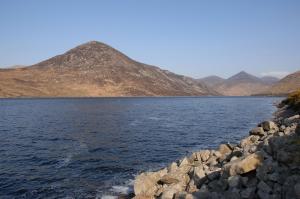Risks of playing in and around water
Date published:

Keep away from danger
Swimming outdoors is very different to swimming in a pool. Know your limits and make sure your ability is enough for the conditions.
Unattended waters can be unsafe for swimming, and full of dangers. This includes:
- rivers
- lakes
- loughs
- reservoirs
- at the coast
- out-of-bound areas such as quarries, treatment works or even NI Water construction sites
It's important to spot and keep away from dangers, including:
- very cold temperatures - the water can be colder than expected, even in warm weather and you can get 'Cold Water Shock'
- hidden currents - there can be strong underwater currents which can trouble even the most confident of swimmers
- deep waterways - it is difficult to estimate depth and they can be deeper than you expect
- hidden debris or underwater hazards which can cause injury, including weeds and plants which can entangle people under the water
- if it’s polluted it could make you ill
- it can be very difficult to get out (especially steep slimy banks)
- there are no lifeguards on duty (unless at certain beaches)
- the remoteness of some of these places can also delay rescue attempts
If you are going to go swimming, make sure that somebody is nearby so you can shout for help if you get into difficulties.
Quarries
Quarries are not a playground, and quarry lakes in particular pose the greatest risk.
They are often much colder than rivers, lakes and reservoirs as they can be fed by water sources that originate deep underground.
A sudden plunge into cold water and 'Cold Water Shock' starts a gasp response, which can cause drowning within seconds.
You can get more information at this link:
Tips on staying safe
You should stay away from quarries, treatment works or construction sites.
If there is a place like this nearby, you should:
- obey ‘danger’ signs - reservoirs and treatment works can be dangerous places, so stay well away
- never climb on barriers and fences - they are there to protect you from serious injury and accidents around construction sites
- stay away from trenches and open manholes - they are dirty, deep and may contain hazardous gases
- keep clear of equipment - don’t be tempted to touch diggers, lorries, pipes and other equipment
If someone falls into deep water:
- phone 999 for the emergency services - if you don’t have a phone, shout for help but do not go into the water
- encourage the person in the water to try and float on their back and if there is
rescue equipment nearby, throw it to them - never enter the water to try and save someone - you are likely to suffer from 'Cold Water Shock' which will leave you unable to help, even if you're a strong swimmer
If you fall into deep water:
- you should lie on your back and float
- fight the instinct to panic or swim - it’s better to just float
- lie back and keep your airways clear, push your stomach up and extend your limbs, moving hands and feet to help you float
- try to control the effects of 'Cold Water Shock' such as the gasping reflex - once your breathing is controlled, call for help and, if possible, try making your way towards safety
You can find out more about water safety on the keeping safe on waterways and at the coast page.
There is also water safety advice at this link:
A swim or a dip outdoors may seem like a great idea, particularly on a very warm day, but it could all end in tragedy.
Don’t take the risk.